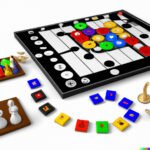Are you looking for a way to entertain and engage your children without relying on electronic screens? Look no further than the timeless appeal of classic kids board games. These beloved games have been entertaining children for generations, and their enduring popularity continues to make them a staple in homes and classrooms around the world.
From the traditional charm of Monopoly to the strategic fun of chess, classic kids board games offer a wide range of educational and social benefits for children of all ages. In this article, we will explore the history, benefits, and tips for selecting and teaching these beloved games to your children.
Whether you’re a parent looking to introduce your kids to the games you loved as a child or an educator searching for engaging activities for your students, classic kids board games offer something for everyone.
Join us as we take a detailed look at the most popular and enduring classic kids board games, discussing their origins and evolution, educational advantages, and strategies for introducing them to children. We’ll also share tips on selecting the perfect game for your child’s age and interests, as well as ideas for incorporating these games into family game night. Get ready to explore the wonderful world of classic kids board games.
The History of Classic Kids Board Games
Classic kids board games have a rich and fascinating history that dates back centuries. These beloved games have evolved over time, reflecting changes in society, technology, and cultural preferences. Let’s take a closer look at the origins and evolution of classic kids board games:
- Ancient Origins: Many classic kids board games have roots in ancient civilizations, such as Egypt and Mesopotamia. Games like Senet and Mancala were played thousands of years ago and have influenced modern board game design.
- 19th Century Innovations: The 19th century saw the rise of popular classic kids board games such as Snakes and Ladders, which originated in India, and The Game of Life, which reflected the values of Victorian society.
- Twentieth-Century Boom: The 20th century brought a surge in classic kids board game popularity with the introduction of timeless favorites like Monopoly, Clue, and Scrabble. These games became household staples and are still widely enjoyed today.
- Modern Trends: In recent years, classic kids board games have continued to evolve with the advent of new technologies. Many traditional games now have digital versions, making them more accessible to a tech-savvy generation.
The history of classic kids board games is a testament to their enduring appeal and adaptability. From ancient civilizations to modern-day innovations, these beloved games continue to captivate children and adults alike.
Top 10 Must-Have Classic Kids Board Games
Classic Kids Board Games have been a staple in households for generations, providing hours of entertainment and learning opportunities for children of all ages. These classic games have stood the test of time, remaining as popular today as they were decades ago.
Whether it’s the excitement of competition or the joy of spending quality time with family and friends, these timeless games continue to bring people together. Here is a detailed look at the most popular and enduring classic kids board games:
1. **Candy Land:** This colorful and simple game is perfect for young children, teaching them colors and counting while they navigate through the magical candy-themed world.
2. **Chutes and Ladders:** A game that combines luck and strategy, Chutes and Ladders provides kids with a fun way to learn about cause and effect as they climb ladders and slide down chutes.
3. **Monopoly Junior:** This simplified version of the classic Monopoly game introduces young players to basic money management skills while they buy properties, collect rent, and build their own little empires.
4. **Sorry.:** With its combination of strategy and luck, Sorry. teaches kids about decision-making as they race to get their pieces back home while sending opponents’ pieces back to the start.
5. **Scrabble Junior:** This kid-friendly version of Scrabble helps children practice spelling and word recognition in a fun and engaging way.
6. **Operation:** A game that not only tests children’s hand-eye coordination but also introduces them to the concept of empathy as they perform “surgery” without setting off the buzzer.
7. **Battleship:** This classic game teaches kids logical thinking as they strategically place their ships on the grid while trying to sink their opponent’s fleet.
8. **Connect 4:** With its simple rules and quick gameplay, Connect 4 helps children develop their critical thinking skills as they try to form a row of four checkers in any direction.
9. **Guess Who?:** Encouraging deductive reasoning, Guess Who? challenges kids to ask yes-or-no questions to determine the mystery character on their opponent’s game board.
10. **The Game of Life Junior:** As a simplified version of The Game of Life, this game introduces kids to decision-making regarding various life choices such as going to college or choosing a career path.
These top 10 must-have classic kids board games are not only entertaining but also provide valuable learning experiences for children across different age groups. From teaching basic counting skills to introducing concepts like decision-making and strategic thinking, these games continue to play an important role in childhood development.
Benefits of Playing Classic Kids Board Games
Playing classic kids board games offers a wide range of educational and developmental benefits for children. These games provide an opportunity for kids to practice essential skills such as critical thinking, decision-making, and problem-solving. Whether it’s navigating through a maze in a game of Ludo or strategizing in a game of chess, children are actively engaging their brains and honing their cognitive abilities.
In addition to cognitive development, classic kids board games also promote social interaction and communication skills. When playing these games, children learn how to take turns, follow rules, and cooperate with others. This helps them develop important social skills that are crucial for navigating relationships and interactions later in life. Furthermore, playing board games can also foster sportsmanship and resilience as children learn how to win graciously and handle defeat with grace.
Moreover, classic kids board games can also have a positive impact on emotional development. Many of these games involve elements of chance and uncertainty, teaching children how to cope with unexpected outcomes and manage their emotions in a healthy way. By experiencing both success and failure in a controlled environment, kids can develop resilience and emotional regulation skills that will serve them well as they navigate the challenges of growing up.
How to Choose the Perfect Classic Kids Board Game
When it comes to choosing the perfect classic kids board game for your child, there are several factors to consider. From their age and developmental stage to their personal interests and preferences, finding the right game can make all the difference in their enjoyment and engagement. Here are some tips for selecting the best game for your child:
Consider Age-Appropriateness
One of the first things to consider when choosing a classic kids board game is your child’s age. Younger children may not have the attention span or understanding for more complex games, while older children may find simpler games too easy and boring. Look for games that are specifically designed for your child’s age group, with age recommendations clearly marked on the packaging.
Take Their Interests Into Account
Another important factor to consider is your child’s interests. Do they love animals? Are they fascinated by outer space? Do they enjoy solving puzzles? There are classic kids board games to suit a wide range of interests, so try to choose a game that aligns with what your child enjoys. This will not only increase their excitement about playing but also potentially help them learn new skills or information related to their interests.
Seek Out Educational Value
Many classic kids board games offer educational benefits in addition to being fun. Look for games that incorporate learning elements such as counting, reading, strategy, problem-solving, or critical thinking. These types of games can help support your child’s cognitive development while they’re having a great time playing. Be sure to read reviews and do some research on the educational value of different board games before making a purchase decision.
By considering these tips and taking the time to understand your child’s needs and preferences, you can select the perfect classic kids board game that will provide hours of enjoyment and valuable learning experiences.
Tips for Teaching Classic Kids Board Games
Teaching classic kids board games to children can be a fun and rewarding experience. Whether it’s introducing them to timeless favorites like Candy Land, Chutes and Ladders, or Monopoly, there are several strategies that parents and educators can use to make the learning process enjoyable and engaging for kids of all ages.
1. **Keep it simple:** When teaching classic kids board games to young children, start with the basics. Explain the objective of the game, the rules, and how to win. Use simple language and take your time going over the instructions to ensure understanding.
2. **Demonstrate play:** After explaining the rules, demonstrate how to play the game. Show children how to take turns, move game pieces, and follow any specific instructions on the board or cards. Visual demonstrations can be especially helpful for younger kids.
3. **Encourage practice rounds:** Allow children to practice playing a round or two with your guidance before letting them play independently. This will give them a chance to apply what they’ve learned in a low-pressure environment.
By using these teaching strategies, adults can help children develop important skills such as following rules, taking turns, making decisions, and strategizing-all while having fun with classic kids board games.
| Teaching Strategy | Description |
|---|---|
| Keep it simple | Start with basic instructions and use simple language. |
| Demonstrate play | Show children how to play through visual demonstrations. |
| Encourage practice rounds | Allow children to practice playing with guidance before independent play. |
Classic Kids Board Games for Family Game Night
Building Stronger Relationships
Family game night is not just about playing games; it’s also a great way to build stronger relationships and create lasting memories. When families come together to play classic kids board games, it provides an opportunity for bonding and fostering deeper connections. Whether it’s the excitement of competition, the laughter from funny moments during gameplay, or the shared sense of accomplishment, these experiences can strengthen the family unit.
Promoting Communication and Cooperation
Classic kids board games often require communication, teamwork, and cooperation. Games like “Monopoly,” “Scrabble,” or “Clue” encourage players to strategize, negotiate, and work together towards a common goal. Through these interactions, children learn important social skills such as taking turns, following rules, and being gracious winners or losers. Family game nights provide a platform for children to hone these skills in a fun and supportive environment.
Fostering Positive Memories
Family game nights filled with classic kids board games create lasting positive memories for children. These nostalgic moments can shape their perceptions of family time and help them associate togetherness with happiness and warmth.
As parents reminisce about their own childhood experiences with these games, they have the opportunity to pass down traditions and create new memories with their own children. The shared enjoyment of playing classic kids board games can become a cherished family tradition that strengthens the familial bond for years to come.
Nostalgia Factor
As the article draws to a close, it’s clear that classic kids board games hold a special place in the hearts of many. Whether it’s reminiscing about childhood memories or creating new ones with our own children, these games have a unique way of bringing people together. The nostalgia factor is a powerful one, as parents and children alike bond over the same timeless games that have been enjoyed for generations.
In today’s fast-paced world, the simple joy of gathering around a board game can provide an invaluable opportunity for quality time and interaction. From the laughter shared during gameplay to the lessons learned through winning and losing graciously, classic kids board games offer more than just entertainment – they provide meaningful experiences that can be cherished for years to come.
While technology continues to advance and new forms of entertainment emerge, there’s something irreplaceable about the tactile experience of rolling dice, moving game pieces, and engaging in friendly competition with loved ones. The nostalgia factor reminds us of the enduring value of these classic games, ensuring that they remain a cherished tradition in many households around the world.
So whether you’re reliving your own childhood memories or creating new ones with your children, classic kids board games continue to stand the test of time as enduring favorites that bring joy and connection to families everywhere.
Frequently Asked Questions
What Are 5 Classic Family Games?
Classic family games include Monopoly, Scrabble, Uno, Sorry!, and Clue. These games have been enjoyed by families for generations and continue to be a staple in many households for game nights and gatherings.
What Is the Most Popular Traditional Board Game?
The most popular traditional board game is likely Chess. This ancient strategy game has been played for centuries and has a dedicated following around the world. Its simple yet complex gameplay makes it a timeless favorite for players of all ages.
What Is One of the Oldest and Most Popular Board Games?
One of the oldest and most popular board games is Backgammon. Believed to have originated over 5,000 years ago in the Middle East, it has stood the test of time and remains a beloved game with a rich history. Its combination of luck and strategy continues to appeal to players worldwide.

I love playing all kinds of games – from classics like Monopoly to modern favourites like Ticket to Ride.
I created this blog as a way to share my love of board games with others, and provide information on the latest releases and news in the industry.





